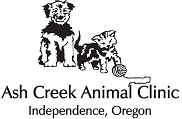DENTAL CARE IN DOGS AND CATS
As they age, most dogs and cats develop dental disease. If not treated, the tartar and gingivitis characteristic of early dental disease will lead to bad breath, loss of gum tissue, mouth infections and, eventually, to loss of teeth. Severe dental disease impacts the entire body, and can lead to serious diseases of the heart, kidneys, and liver. The best solution is prevention:
Home Oral Care (Regular use any of these methods will dramatically reduce how often your pet needs in-clinic dental cleanings):
Brushing–The best option is brushing your pet’s teeth several times a week with either a pet toothpaste or chlorhexidine mouth rinse. This will remove the soft plaque that forms after every meal and keep your pet’s teeth clean and breath fresh. (Do not use human toothpaste.)
Chlorhexidine Mouth Rinse–Another good option is this oral rinse, used with or without the toothbrush. The rinse should be squirted into the sides of the mouth onto the teeth daily, to reduce oral bacteria and help keep the teeth and breath clean. The antibacterial effect will last up to 24 hours.
Enzymatic Chew Treats–Enzymatic rawhide chews (not regular rawhides) utilize an enzyme system to clean the teeth and reduce oral bacteria as your pet chews. These can be given as a treat several times a week, or daily. (May be used alone regularly, or combined with any of the other methods to increase efficacy while giving your cat or dog a special treat.)
T/D—This is a food made by the Hill’s company which is designed to clean the teeth as your pet chews it. T/D does a very good job maintaining already clean teeth, and may be used in conjunction with any of the other methods of home care listed above.
In-Clinic Dental Cleaning:
Most pets, as they age, will eventually need in-clinic dental care. Teeth that are already in bad shape (lots of tartar, severe gum disease, loose or infected teeth) will need professional treatment before home oral care can be most effective. (However, even severely diseased teeth can benefit to some extent from home oral care until an in-clinic cleaning can be scheduled.) Pets with very good home care will probably need occasional in-clinic care to preserve their healthy teeth for a lifetime. (Frequency will depend to some extent on genetics.)
In-clinic dental cleaning is a procedure done under anesthesia, in which the teeth are fully examined and charted, and then cleaned using an ultrasonic dental unit. The clean teeth are then polished. Any retained baby teeth or teeth that are badly diseased may be removed at this time, as well.
Pets that get regular home care will need in-clinic dental care much less often than pets with no home care. Even if you haven’t done any oral home care prior to the in-clinic cleaning, starting right afterwards will preserve your pet’s clean mouth and oral health for a much longer time than if none is used. See above list of home care options.


